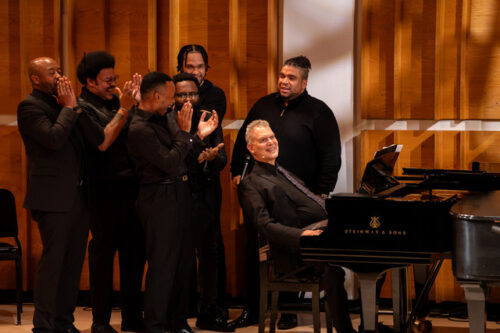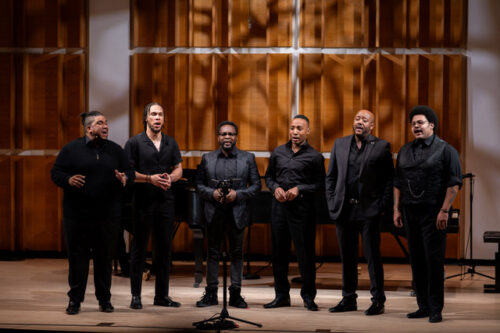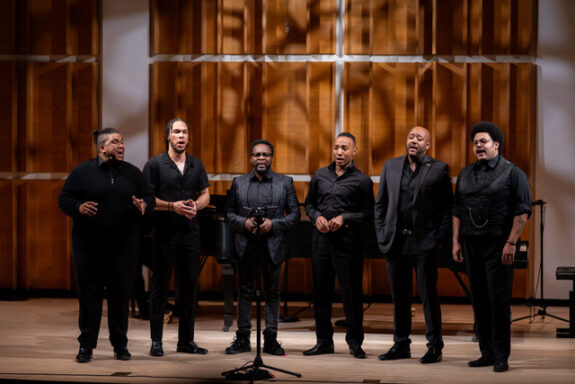 United States New York Festival of Song – ‘My Brother’s Keeper’: Joshua Blue, Chaz’men Williams-Ali (tenors), Will Liverman, Jorell Williams (baritones), Joseph Parrish, Alan Williams (bass-baritones), Steven Blier (piano). New York Festival of Song, Merkin Hall at Kaufman Music Center, New York, 20.11.2024. (RP)
United States New York Festival of Song – ‘My Brother’s Keeper’: Joshua Blue, Chaz’men Williams-Ali (tenors), Will Liverman, Jorell Williams (baritones), Joseph Parrish, Alan Williams (bass-baritones), Steven Blier (piano). New York Festival of Song, Merkin Hall at Kaufman Music Center, New York, 20.11.2024. (RP)

Jorell Williams – ‘Americana/Go Down Moses’
Traditional – ‘Come Unto Me’ (arr. Take 6)
Margaret Bonds – Three Dream Portraits
Brahms – ‘Die Schwestern’
H. Leslie Adams – ‘Sence You Went Away’ from Nightsongs: Six Afro-American Songs.
William Grant Still – ‘A Black Pierrot’
Rachel Peters – ‘Santa Ain’t Black’
Harry Revel & Noble Sissle – ‘Guiding Me Back Home’
Richard Rodgers – ‘Some Enchanted Evening’ from South Pacific (arr. Will Liverman)
Steve Lutvak – ‘Beware the Anger of Soft-Spoken Men’
Traditional – ‘Sylvie’ (attributed to Huddle Ledbetter/Lead Belly)
Bizet – ‘Au fond du temple saint’ from Les pêcheurs de perles
Bobby Scott & Bob Russell – ‘He Ain’t Heavy, He’s My Brother’
Jorell Williams – ‘Hold Fast to Dreams’
The concept for ‘My Brother’s Keeper’ came to baritone Justin Austin in a dream: to present a concert with fellow Black singers in the vein of the American a cappella group Take 6, a sextet of Black male singers who integrate jazz, inspirational lyrics and a positive vibe. Austin grew up with positive role models but realizes that is not the case for all Black youngsters. To his way of thinking, there was no better way to express the brotherly love, caretaking and community among many American Black men than to spread the word through song.
Steven Blier, New York Festival of Song’s founder and artistic director, jumped on the concept. Austin had to bow out of the performance due to scheduling conflicts and was not among the six singers who performed in ‘My Brother’s Keeper’ – tenors Joshua Blue and Chaz’men Williams-Ali, baritones Will Liverman and Jorell Williams and bass-baritones Joseph Parrish and Alan Williams. Blier was seated at his customary place at the piano, and most of the men took a turn center stage playing the second one.

In addition to being a singer and pianist, Jorell Williams is also a composer. The evening began with Williams at the piano performing ‘Americana/Go Down Moses’, a profound musical meditation that he wrote in response to George Floyd’s murder in 2020. He was then joined by the other men to sing the hymn ‘Come Unto Me’ in the classic Take 6 arrangement. The jazzy style and tight harmonies were a perfect fit for these singers.
Margaret Bonds had personal ties with Langston Hughes, a central figure in the Harlem Renaissance, whose poems she set in Three Dream Portraits. In ‘Minstrel Man’, the first of the three, Liverman expressed the pain of a black minstrel who may be laughing but is suffering on the inside. As Liverman sang of the minstrel’s despair, his voice tapered off to a hollow, lifeless sound.
Next, Parrish sang ‘Dream Variations’ with elegance and eloquence. The jubilant song ended with him expressing the coming of the night in soft, soaring, ethereal tones that drifted through the hall. The final song was ‘I, Too’, in which Jorell Williams sang of the degradations suffered by a Black man with his arms folded in defiance and his voice just as biting. When singing of the day when White people will realize the Black man’s beauty, Williams’s voice conveyed warmth and his body language expressed pride.
Things took a lighter turn with Alan Williams and Chaz’men Williams-Ali singing Brahms’s ‘Die Schwestern’ as a duet for two male singers. It was a mix of high camp and male bonding (until a girl got in the way). Williams-Ali quipped that the only time the song may have possibly been sung by two men was in a gay Lieder bar.
Joshua Blue melted hearts with his rendition of ‘Sence You Went Away’, the fifth song of H. Leslie Adams’s song cycle Nightsongs: Six Afro-American Songs. He introduced it by telling of his work with Oberlin Music at Grafton, a prison choir at the Grafton Correctional Institution. The message he delivered was that many of the incarcerated are not bad people, just trapped in a system where minor violations can spiral into years of jail time. And, of course, the overwhelming number of inmates are people of color.
The next two songs were a study in contrasts. Alan Williams turned ‘A Black Pierrot’, William Grant Still’s setting of another Langston Hughes poem, into a searing aria full of danger, irony and pain. The suffering depicted in Rachel Peters’s ‘Santa Ain’t Black’ was that of a Black man doing a stint as Jolly Old Saint Nick at a mall in Jersey City. Amidst the laughter, reality hit when Willams sang of the man’s dreams of being a post-racial Santa going up in smoke when he went into full melt-down mode and shouted ‘Santa ain’t Real’.
Blier introduced ‘Guiding Me Back Home’ by noting it is one example of a collaboration between Jewish and Black artists. (Blier himself is Jewish.) Harry Revel was a British-born American composer of Jewish descent. His collaborator was Noble Sissle, who wrote the hit song, ‘I’m Just Wild About Harry’. ‘Guiding Me Back Home’ got its due with Parrish and Chaz’men Williams-Ali’s singular combination of style and vocal flair.
Liverman then took a seat at the piano to perform his own arrangement of ‘Some Enchanted Evening’ from South Pacific. It was captivating to hear those familiar strains transformed by Liverman’s subtle harmonic shifts and changes to the melody.
In another rapid change of mood, Parrish, Alan Williams, Jorell Williams and Chaz’men Williams-Ali performed Steve Lutvak’s ‘Beware the Anger of Soft-Spoken Men’. The five dug into Lutvak’s hymn to the joys of being passive-aggressive as a surreptitious alternative to showing authentic anger. However, the final ‘Beware’ was a warning that the danger was real.
Parrish can get under the skin of any song, and that is what he did to ‘Sylvie’, a Harry Belafonte classic. Parrish, with Alan Williams on the guitar, beguiled the audience with his smooth singing and smile. Parrish then went to the piano to partner with Blier in accompanying Blue and Liverman in ‘Au fond du temple saint’ from Bizet’s Les pêcheurs de perles. It was a reminder that all six men have careers in opera.
Chaz’men Williams-Ali simply wowed in ‘He Ain’t heavy, He’s My Brother’. The ballad has been covered by some great artists, but the power and sincerity with which he sang and played was uniquely his own. When the other men rose to cap the song with resounding ‘Amens’, this late-sixties pop standard became a soaring, inspirational anthem of hope.
Before the applause had a chance to die down, Jorell Williams announced that they had a built-in encore to sing, his ‘Hold Fast to Dreams’. The six men sang Williams’s setting of more of Langston Hughes’s words expressing dreams to be pursued and choices to be made with determination and pride. One marveled at the sincerity and artistry of all on stage.
Rick Perdian
